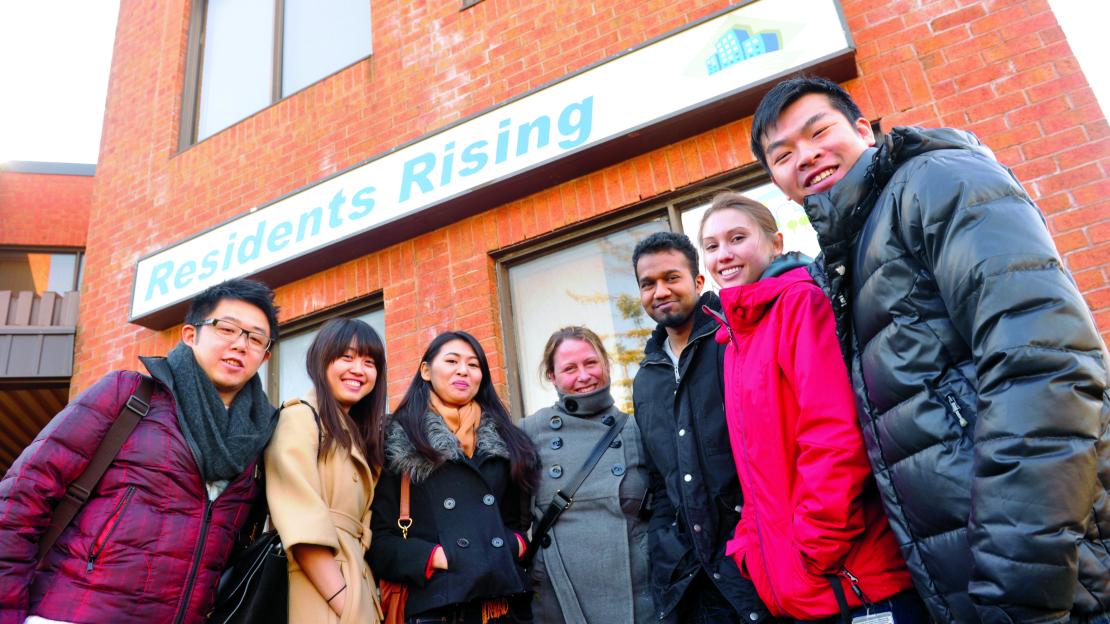Where is the best place to learn and discuss ideas about a common, beneficial development? At heart, this is an issue of scale; such discussions should be occurring at every level of interaction, from global to local. But because we are social beings, perhaps the most effective place to learn about or work for a common good is at the immediate local level, a scale of close physical proximity. Through involvement with community, particularly in neighbourhood settings, individuals can learn about and work towards common understandings. The benefits of this process, both for the individual and the community at large, can be profound.
The cultivation of discussions about what is good for a community can engender personal development in individuals. The very act of learning about the contexts, perspectives and everyday life situations of others is crucial to developing the personal attributes, such as empathy and compassion, that are critical to helping build a larger sense of community. These skills can be developed through experience and interaction. Not knowing our neighbours or the history of our neighbourhood street, why a certain place looks and feels the way it does, how communities have grown, or how and why new residents have arrived in a community fosters a disconnection from our immediate surroundings and limits our ability for engagement. Local communities are far from being free of conflict and power inequalities, but it is through debate of issues, the act of getting to know our communities, that community discussions can build towards more common visions.
Drawing from these ideas, the City Studies program at the University of Toronto Scarborough attempts to develop student understanding of community issues through experiential learning. The community outreach initiative focuses on the Kingston-Galloway/Orton Park (KGO) neighbourhood, in close proximity to the UTSC. Selected in 2005 by the City of Toronto and the United Way of Greater Toronto as one of 13 “priority neighbourhoods,” KGO receives funding for social infrastructure projects. Since funding implementation began in 2008, new community-based development programs and resident engagement activities have been established to address issues such as residential isolation, poverty, unemployment and the unique settlement needs of new residents. Neighbourhood organizations such as the East Scarborough Storefront, Boys & Girls Club of East Scarborough and Residents Rising manage such programs, alongside City of Toronto departments such as Public Health and Shelter, Support and Housing Administration and the United Way’s Action for Neighbourhood Change project.
Through a partnership between UTSC and the East Scarborough Storefront that began in 2008, City Studies students work alongside community members in the development of new social infrastructure. So far, the students have worked in community gardens at a neighbourhood elementary school, provided street-level outreach to inform youth about neighbourhood recreational programs, and conducted interviews with local business owners about strategies for local employment and community economic development, among many other activities. These experiences count towards course credits but also foster the empathic and social development of young citizens and a deeper awareness of citizenship.
The aim of the City Studies community outreach initiative is to build upon the educational power of these community-level experiences and interactions. Through civic engagement, students gain a much more nuanced understanding of broader topics such as human rights, social issues and economic and environmental concerns. Micro-scale interactions among students, community organizations and residents in the KGO neighbourhood and other local communities allow individuals to understand one other and to create relationships that encourage discussions of common goals and visions for the neighbourhood. It is through such practices, in a particular time and place, that an idea of a “common good” at a community scale can be discussed, agreed upon, and fostered.
Susannah Bunce is an assistant professor of geography at UTSC.
